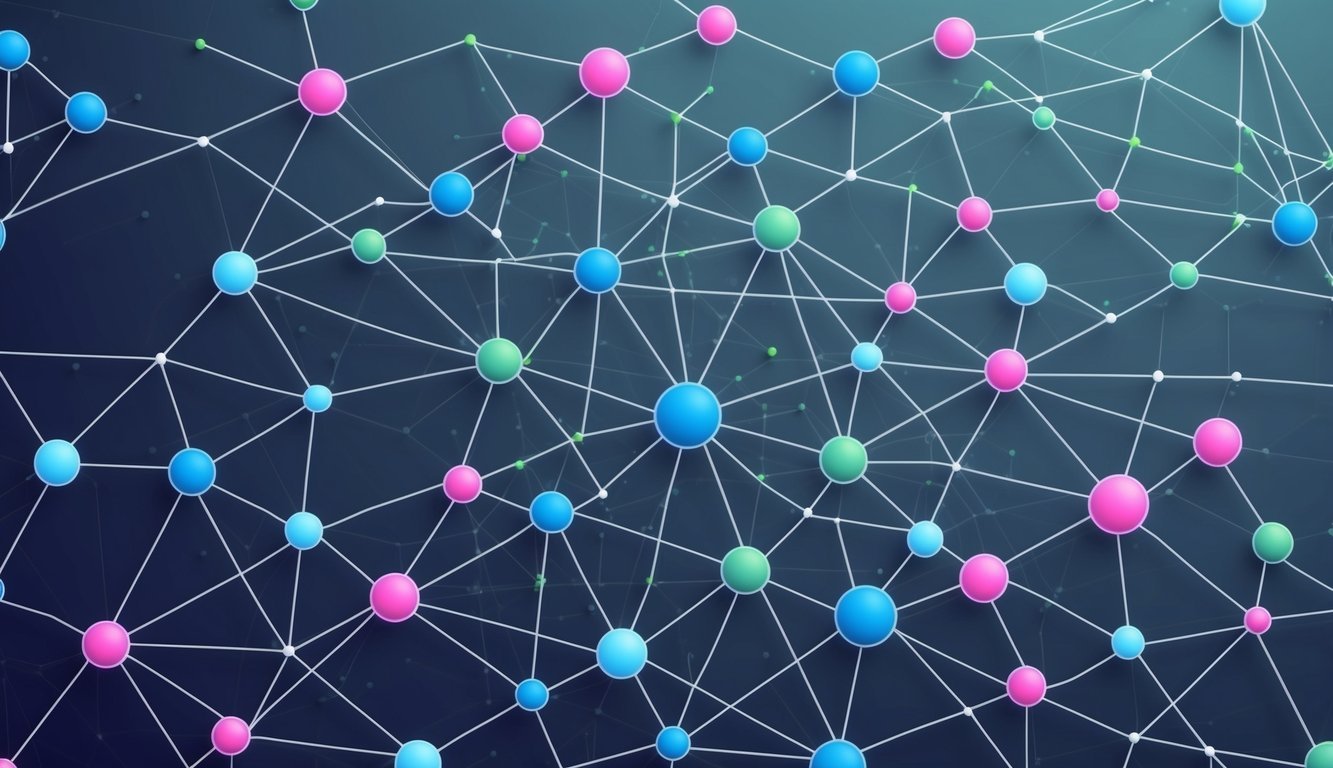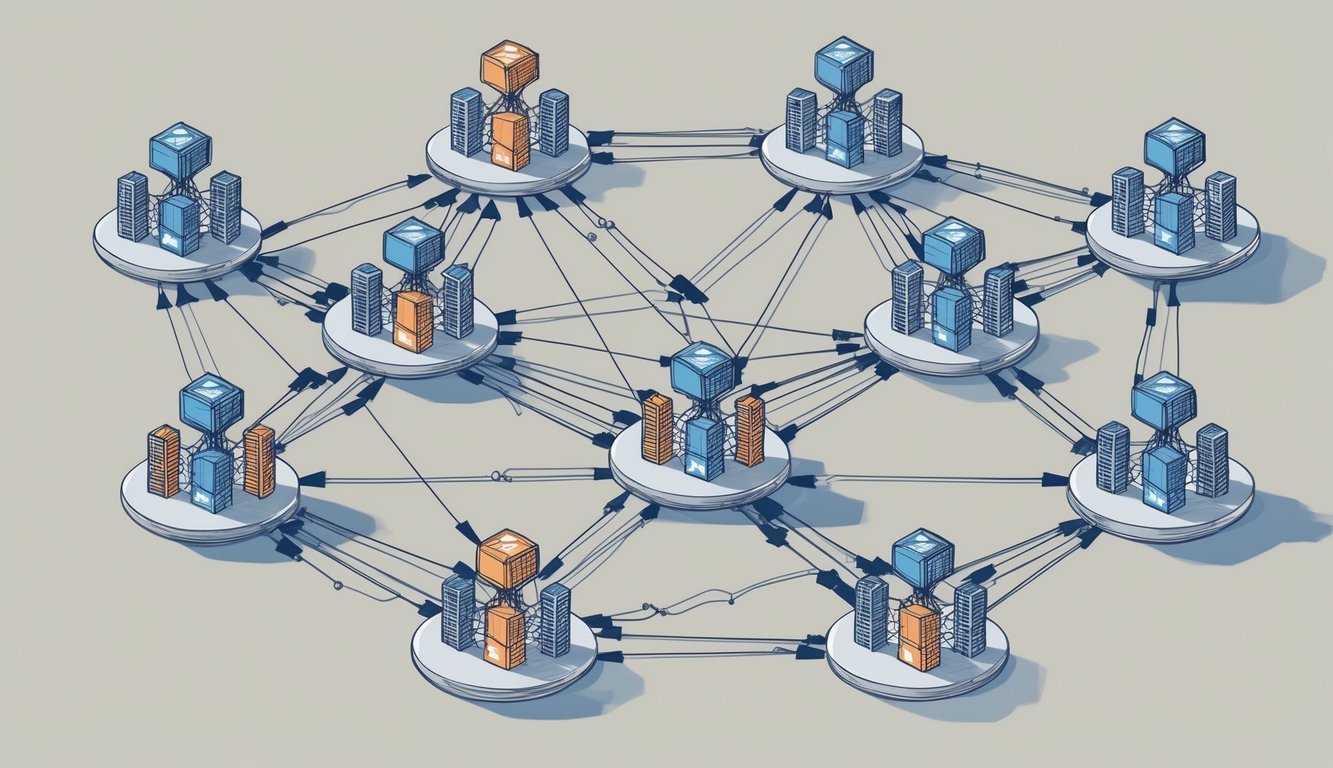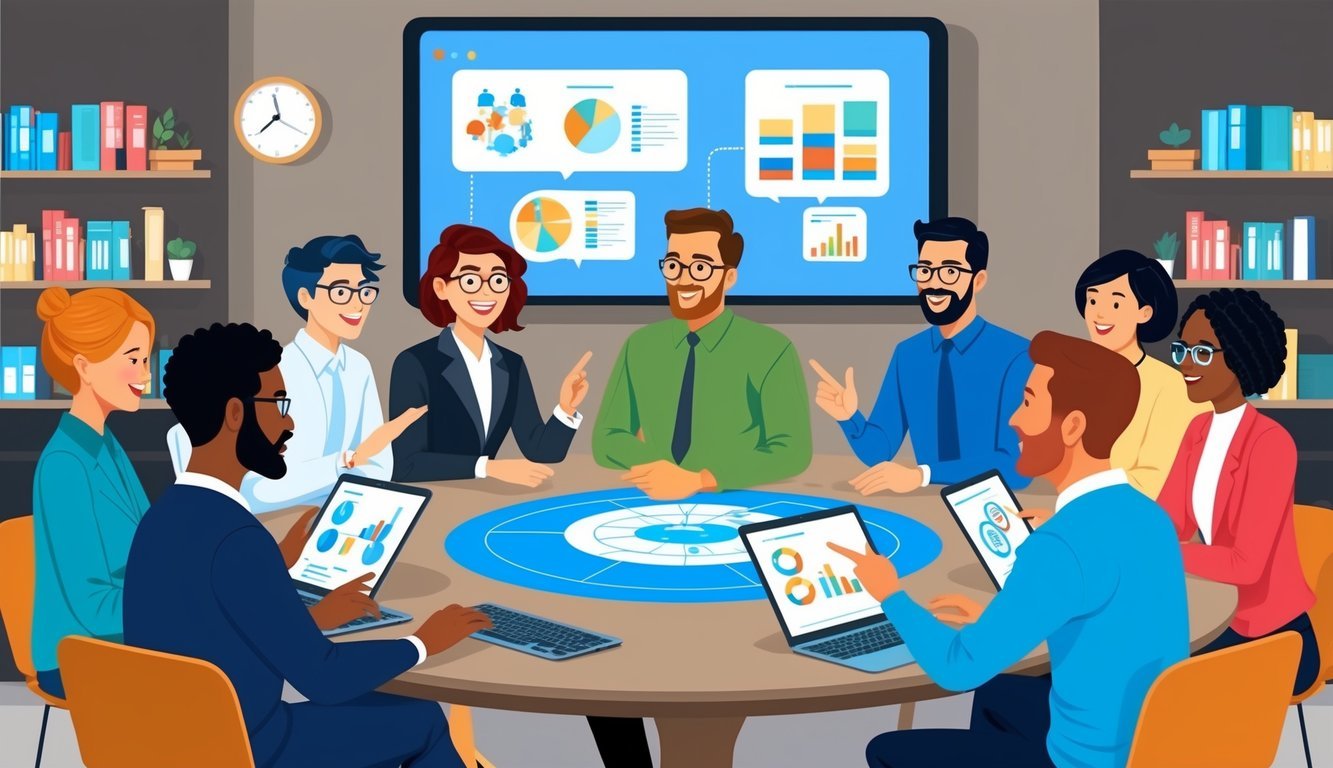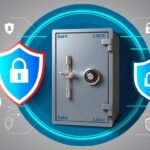DAOs are changing how groups work together online. They let people team up and make choices without bosses. Decentralized autonomous organizations (DAOs) use blockchain tech and special rules to help members vote and manage money without a central leader.

You might wonder how DAOs work. They use smart contracts, which are like digital promises that run by themselves. These contracts handle voting and keep track of who owns what. This setup lets DAOs work in a way that’s open for all to see.
DAOs can be used for many things. Some help people invest money together. Others let fans support their favorite artists. There are even DAOs that try to buy real-world stuff, like rare books or land. As more people learn about DAOs, they might change how we think about working together online.
Key Takeaways
- DAOs use blockchain to let groups make decisions without central control
- Smart contracts automate voting and money management in DAOs
- You can join DAOs for investing, supporting causes, or managing shared assets
The Basics of DAOs
DAOs are changing how groups make choices and handle money. They use special computer code to work without bosses. Let’s look at what DAOs are, how they grew, and what makes them special.
What Is a DAO?
A DAO is a Decentralized Autonomous Organization that runs on a blockchain. It’s like a digital club where members decide things together. No one person is in charge.
DAOs use smart contracts. These are computer programs that automatically do what they’re told. They handle the rules and money for the group.
You join a DAO by buying tokens. These tokens give you voting power. The more tokens you have, the more say you get in decisions.
The Evolution of DAOs
DAOs started with Bitcoin in 2009. But they really took off in 2016 with Ethereum. Ethereum made it easier to create smart contracts.
At first, DAOs were just for crypto fans. Now, they’re used for many things:
- Investing in projects
- Running online communities
- Managing charities
- Owning and selling digital art
DAOs keep changing as people find new ways to use them. They’re getting better at solving problems and working smoothly.
Common Traits of DAOs
DAOs share some key features:
Decentralization
: No single leader makes all the choices.Transparency
: Everyone can see what’s happening.Token-Based Governance
: Your tokens are like voting tickets.Automated Rules
: Smart contracts enforce the DAO’s rules.
DAOs often use tools to help members talk and vote. These might be chat apps or special voting websites.
Most DAOs let you leave anytime. You can sell your tokens and exit the group. This freedom is a big part of why people like DAOs.
Mechanics of Operation
DAOs run on rules set by their members and use tech to stay fair and open. They let people work together without needing a boss.
Governance and Voting
In a DAO, you get a say in how things work. Governance tokens give you voting power. The more tokens you have, the more weight your vote carries.
You can suggest changes by making proposals. These might be about spending money or changing rules. Other members then vote on your ideas.
Voting often happens on-chain, meaning it’s recorded on a blockchain like Ethereum. This keeps everything clear and prevents cheating.
Some DAOs use a system called liquid democracy. This lets you give your vote to someone else if you trust their judgment more than your own.
Funding and Treasury Management
DAOs need money to run, and they handle it in a unique way. The group’s funds are kept in a shared wallet that everyone can see.
Members decide together how to use this money. You might vote to fund new projects or pay for work that helps the DAO.
Smart contracts control the treasury. These are computer programs that follow set rules. They make sure money is only spent when enough members agree.
Many DAOs use cryptocurrency for their treasury. This fits well with their decentralized nature and makes global transactions easy.
Smart Contracts Implementation
Smart contracts are the backbone of DAOs. They’re like digital rulebooks that run automatically.
These contracts handle voting, manage funds, and carry out decisions. They’re usually built on blockchain platforms like Ethereum.
When you join a DAO, you agree to follow the rules set in its smart contracts. This helps keep things fair and stops any one person from taking control.
Smart contracts can also connect DAOs to other parts of decentralized finance (DeFi). This lets them invest funds or provide services automatically.
The code for these contracts is often open-source. This means you can check it yourself to make sure everything’s working right.
Types and Examples of DAOs
DAOs come in many shapes and sizes. They serve different purposes and operate in various sectors. Let’s look at some common types and real-world examples.
Protocol and Investment DAOs
Protocol DAOs manage blockchain projects. MakerDAO is a prime example. It oversees the DAI stablecoin. Members vote on changes to the protocol.
Investment DAOs pool resources to buy assets. PleasrDAO is known for buying rare NFTs. They bought the Wu-Tang Clan’s one-of-a-kind album for $4 million.
These DAOs use tokens for voting. The more tokens you hold, the more say you have. This can lead to debates about fairness and decentralization.
Community and Philanthropy DAOs
Community DAOs bring people together around shared interests. BanklessDAO unites crypto enthusiasts. They create content and spread knowledge about decentralized finance.
Philanthropy DAOs focus on social good. They raise funds for causes. Members decide how to use the money. This model makes giving more transparent and democratic.
Social DAOs are rising in popularity. Friends With Benefits is a club for crypto-savvy creatives. You need tokens to join. Once in, you can network and collaborate.
Unique DAOs on the Rise
Some DAOs push boundaries. ConstitutionDAO tried to buy a copy of the U.S. Constitution. They raised $47 million but lost the auction. Still, it showed DAOs’ potential.
Developer DAO supports coders in Web3. They offer grants and mentorship. It’s a new way to nurture talent in a decentralized world.
MolochDAO takes a unique approach to governance. Members can “ragequit” if they disagree with a decision. This protects minority voices.
Challenges and the Future of DAOs

DAOs face hurdles but also have exciting possibilities ahead. New tech and ideas are changing how these groups work and grow.
Navigating Legal Frameworks
You might wonder about the legal status of DAOs. Right now, it’s tricky. DAOs don’t fit neatly into current laws.
Some places are trying to figure it out. Wyoming, for example, now recognizes DAOs as legal entities. But most countries haven’t caught up yet.
This gray area can make it hard for DAOs to:
- Open bank accounts
- Sign contracts
- Pay taxes
As DAOs grow, expect more talks about how to regulate them. You’ll likely see new laws pop up to address these digital-first orgs.
Security and Privacy Concerns
When you join a DAO, you’re trusting code to handle money and decisions. That’s cool, but it comes with risks.
Smart contracts can have bugs. If someone finds a flaw, they might steal funds or mess things up. It’s happened before.
Privacy is another big deal. Everything you do in a DAO is usually public on the blockchain. That’s great for transparency, but not so great if you want to keep things private.
To stay safe, DAOs are:
- Using better code review processes
- Getting security audits
- Looking into privacy tech like zero-knowledge proofs
Innovations and Emerging Trends
DAOs are getting smarter and more creative. You’ll see some cool new stuff soon.
AI is starting to play a bigger role. Imagine DAOs that can learn and adapt on their own. They might make faster, smarter choices.
The Internet of Things could connect with DAOs too. Your smart fridge might one day vote on grocery-related decisions!
Global teamwork is getting easier. DAOs let people from all over work together without borders. This could lead to huge, world-changing projects.
Open-source software is key. As more people build and share DAO tools, you’ll see these orgs pop up in all kinds of industries.
Frequently Asked Questions

DAOs are changing how groups make choices and handle money online. People join DAOs in different ways and face some risks. Let’s look at how DAOs work, their tokens, and their role in new tech.
How do DAOs make decisions and manage collective funds?
DAOs use voting to make choices. Members with tokens can vote on ideas. The more tokens you have, the more say you get.
For money stuff, DAOs often use smart contracts. These are computer rules that control how funds are used. They make sure money only moves when enough people agree.
In what ways can someone get involved with or become a member of a DAO?
You can join a DAO by buying its tokens. Some DAOs let you earn tokens by helping out.
You might write code, make art, or share ideas. Each DAO has its own rules for joining. Some are open to all, while others are invite-only.
What are the main risks and challenges associated with participating in a DAO?
DAOs can be tricky. The rules might be unclear or change fast. Hackers could try to steal funds.
There’s also the chance that laws about DAOs might change. This could affect how they work or if they’re allowed.
Could you give examples of successful Decentralized Autonomous Organizations and what they do?
BanklessDAO is a group that spreads info about crypto. They make content to teach people about digital money.
Another example is MakerDAO. They run a system for lending and borrowing crypto. Users can get loans or earn interest on their coins.
How do governance tokens function within DAOs?
Governance tokens are like voting cards in DAOs. When you own these tokens, you can vote on decisions.
The more tokens you have, the more power your vote has. You can also trade these tokens with others.
What role do DAOs play in the advancement of Web3 technologies?
DAOs are a big part of Web3. They show how online groups can work without bosses.
DAOs help test new ways of working together on the internet. They’re trying to make online spaces more fair and open for everyone.





